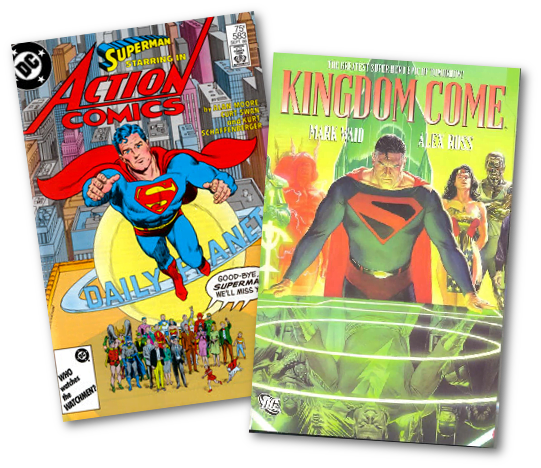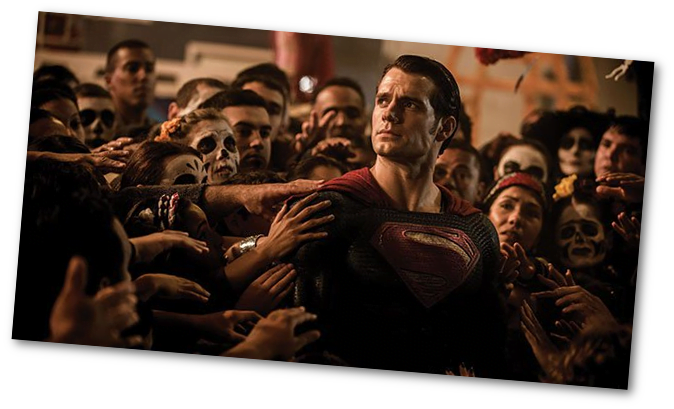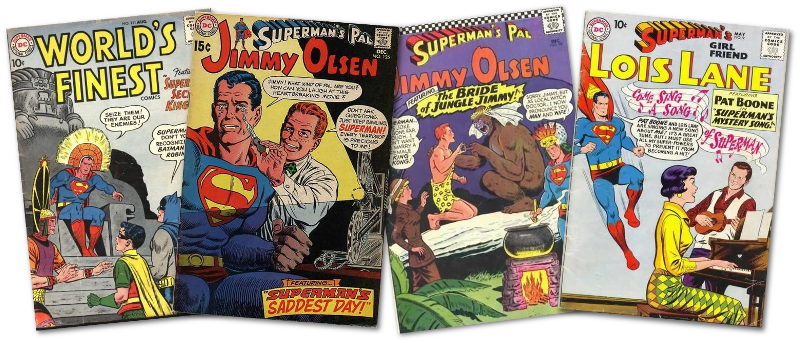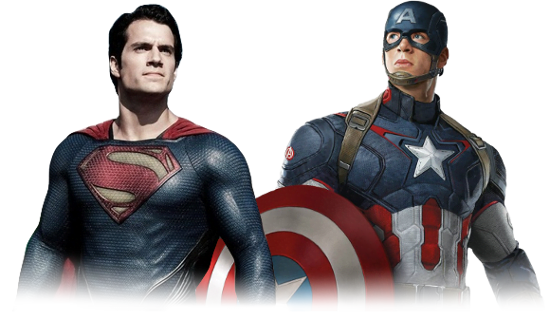The comparison between Superman and Captain America is very much like the comparison between tractors and trucks. They’re not an unreasonable comparison to make, especially when you only know of either thanks to movies, but the more you know about either the less the comparison works. The two have some very broad similarities, but when you start to talk about the kind of stories they can tell, things start to break down.
The story of Superman is the story of a character who already has power. Nobody gave it to him; it was not something he was, at one point, without, then given it anew. Superman’s power was simply a byproduct of being, and then the question becomes what will he do with this power in the world. To Superman, the story of his power is the story of someone who saw the world, as it is, and saw his power, and thought that the best thing he could do, that would fulfill his already-extant values, was to be Superman.

Captain America’s story is the opposite; he was someone who had no power. Defining his narrative almost always was a willingness to put what little power he had on the line, to his own death, to save people, to protect people, against what he saw was an unreasonable force of violence. This then was used as proof that he was worthy of power.
The difference between being given power versus what you do if you already had that power is not a small one. Superman literally cannot understand what it is like to be powerless. His use of power is not out of an emotional reflexivity – he cannot be acting in a way that echoes how he wish someone would have treated him. Whenever he exerts power it is an outsider to vulnerability, it is as someone who is trying to do good without it necessarily being about how he feels about it.
At the same time, Superman could just stop being Superman tomorrow. Indeed, two of the best Superman stories – Whatever Became of the Man of Tomorrow and Kingdom Come – are both built around the question of Superman stopping Supermanning. Interestingly, both of those stories were reflections of authors who were themselves tired with the events of storytelling in their respective universes.

What’s more, Captain America is walking around wearing the branding of a country, as an extension of that country’s military. A country whose military has kind of already set a precedent for how it works and how it looks and how people should regard it when it wanders into their space. This colours how the character looks in stories told about him.
When Superman flies into Botswana to rescue someone, that’s not actually weird or bad. He’s Superman. He’s being Superman. It makes sense. Superman is in the neighbourhood, and can reach the whole world. He can belong to the whole world, even though yes, his iconographic image is that of a white guy. Captain America in that same situation, though, begs the question of what are you doing here, and inevitably, the answer is some form of military adventurism, or trying to accommodate the aftermath of military adventurism.
This tends to mean Captain America is used best to represent the story of the American Moral Landscape As It Is versus the American Moral Landscape As It Should Be. There’s the idea of two Americas – one that is an entirely reptilian, selfish entity that makes the world act in accordance with own selfish needs, and one that is idealistic and perceives its place as improving the world. America acts most powerfully when it can align those two self-images, and it is at its most moral when those forces are capable of opposing one another. Captain America needs to be that opposition.

One of the weird and honestly sad things is, of late, Superman has kind of become an American symbol, and also kinda a symbol of being a dick. I discard this interpretation because:
- It involves surface readings of other people’s surface readings of the media symbol
- I want to
Now there’s also a gap of scope of story types but it’s really a soft gap. Any villain Superman fights, probably Cap can fight. It’s not actually that big a deal, because in both cases, those characters are seen as being strong enough to win but also to know how to win well. Superman doesn’t smush people and Captain America doesn’t shoot people, because those are ‘less good’ wins. Yet Captain America’s stories are always going to be about someone who has felt danger, who has been at risk of personal loss, and fights through that fear.
Superman? Totally different. Superman is a rawer story. Superman is about the idea of you having power. About you being safe. About you choosing. Superman started telling the audience a story about the immigrant life, but that story included burning down slums, personally tormenting warmongers, and promoting socialised medicine.
But now, the totem of Superman, the fantasy he represents, the ideal we can live to, anywhere, is
‘if I had power, I would be good’
You know those old Superman stories where he has to juggle or weave baskets or chase dogs or eat burgers? A lot of Superman stories had him doing such fanciful, silly stuff because Superman made the world that much safer in general. There wasn’t any conventional crime to deal with. Most people just didn’t do crime, because Superman was so good at stopping crime that it just went away.
 Superman made most crime go away. It became rare enough that one dude could stop it all. Superman made the world he was in kinder and safer. This is one reason Superman works so well without the greater continuity, without Batman and Aquaman and so on.
Superman made most crime go away. It became rare enough that one dude could stop it all. Superman made the world he was in kinder and safer. This is one reason Superman works so well without the greater continuity, without Batman and Aquaman and so on.
I like both these characters.
I like Cap despite myself. I’m Australian. He should not resonate to me. The dude is a walking flag.
Superman I used to hate. But it was that realisation that he was a person who could be good without any oversight?
That was the ideal.
I know the feeling of rage inside me.
I want that fantasy of the person who will be good, with power, no matter what.
